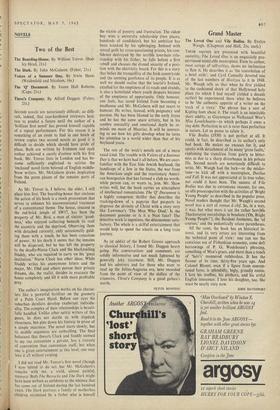Grand Master
The Loved One and Vile Bodies. By Evelyn Waugh. (Chapman and 'Hall, 21s. each.) THESE reprints are presented with beautiful austerity. The Loved One is an exquisitely pro- portioned inimitable masterpiece. Even its author, most savage of self-critics, shows no inclination to flaw it. He describes it •as `the consolation of a brief exile'; and Cyril Connolly devoted one of the last numbers of Horizon to it in 1948. Mr. Waugh tells us that when he first yielded to the cushioned shock of that Hollywood holy place (to which I had myself yielded a decade earlier) he experienced there what he believes to be `the authentic appetite of a writer on the track of a story.' The phrase has a sort of Kipling hum about it. The result is an inimitable short oddity, as Goyaesque as Nathanael West's Miss Lonelyhearts—to which perhaps it owes a tiny debt. Perfection in art is rarer than perfection in nature. Let us pause to salute it.
Vile Bodies (1930) is not perfect at all. It could, in fact, be described as its author's only bad book. He makes no excuses for it, and speaks with detachment of its many `gross faults,' explaining the transition from gaiety to bitter- ness as due to a sharp disturbance in his private life. Second novels are notoriously difficult to write. Mr. Waugh had the luck—or the misfor- tune—to kick off with a masterpiece, Decline and Fall. It was not appreciated at its true value; nor could it have been. The success of Vile Bodies was due to extraneous reasons; for one, an idle preoccupation with the activities of `Bright Young People' as described in the popular press. Novel readers thought that Mr. Waugh's second novel was a sort of roman a clef. So, in a way, it was; but what mars it are the rather horrible Thackerayan moralisings in brackets (`Oh, Bright Young People!'), the flatulent footnotes, the `of courses,' and the pedantically otiose parentheses.
All the same, the book has an historical in- terest, and its very errors are interesting from the technical point of view: one can see the conscious use of Firbankian economy, some deft borrowings of P. G. Wodehouse's phrasing, something of Max's grace, and more than a touch of 'Saki's' mannered ruthlessless. It has the flavour of its time, thirty-five years ago. And Colonel Blount, even if a figure from conven- tional farce, is splendidly, bigly, grandly comic. I love his muffins, his plethora, and his artful English innocence. I love his daughter, too. She must be nearly sixty now.
JOHN DAVENPORT


































 Previous page
Previous page